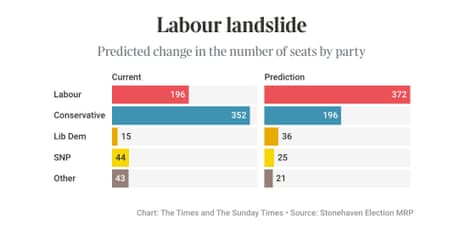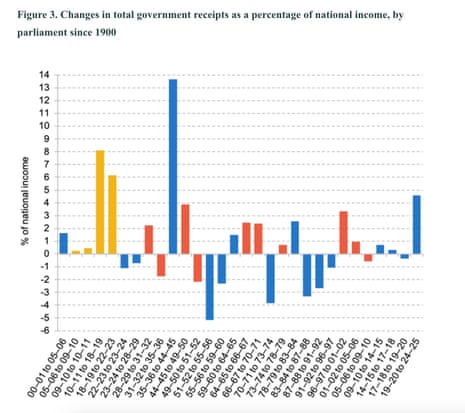Sunak claims ‘anti-motorist’ policies are against British values as he aims to limit 20mph speed zones – UK politics live | Politics
Rishi Sunak says 20mph limits and Ulez ‘aren’t the values of British people’
Good morning. The Conservative party conference starts on Sunday, and this is always a big moment when a governing party can reset, redefine itself and chart a new agenda for the next 12 months. But this time the pressure for a successful reboot is much more intense than usual, for three reasons.
First, it’s Rishi Sunak’s first party conference as leader. Second, the political model he has adopted over the first 12 months (steady “competence”, focusing on the five priorities) has totally failed (if success is judged by electoral performance, which unfortunately is the metric that matters most to MPs). And, third, with the election due in about a year, this is probably a last-chance conference. It’s all or nothing.
That means it will be fascinating to see how Sunak repositions himself, and, in a tremendous scoop last night, Peter Walker provided part of the answer. He is going to put the Conservative party on the side of drivers, with particular measures to curb the extension of 20mph speed limit zones.
The story has, rightly, been widely followed.
In the light of what we know now, it is worth looking again at what Sunak said yesterday during his marathon pre-conference regional TV and radio interview round. The Welsh government has recently introduced a de facto 20mph speed limit for residential areas which Penny Mordaunt, the leader of the Commons, criticised as “absolutely insane”. Asked if he agreed, Sunak told ITV Cymru Wales:
I think imposing a blanket 20 mile-an-hour speed limit on areas is absolutely not right. It doesn’t reflect people’s priorities.
People are dependent on their cars for their day-to-day journeys and these kind of blanket bans aren’t the right proportionate approach.
But also it comes on top of this other policy not to build any new roads as well.
You take these things together, it seems like an attack on motorists and that’s rightly received the opposition that it deserves.
When it was put to Sunak that the 20mph speed limit in Wales was not a blanket ban, because there are exemptions, the PM went further, saying policies like this were not in line with the values of the British people.
He replied:
You’ve seen the opposition from people in Wales to this policy. Look, it’s not alone – a Labour mayor in London imposing the Ulez charge, £12.50 on ordinary families when they’re just trying to get their kids to school, take them to football practice, go weekly shopping or, you know, get to work.
Those aren’t the right values of the British people who do rely on their cars to get around and we should be supportive of them.
I will post more on this as the day goes on.
Otherwise, the only thing in the diary is Keir Starmer speaking at a Labour rally in Rutherglen and Hamilton West, where the byelection takes place next week, at 10.30am. But there might be more reaction to the IFS saying that “it is likely that this parliament will mark a decisive and permanent shift to a higher-tax economy”. And, at some point before it airs at 7pm, GB News may release extracts from its interview with Suella Braverman, the home secretary. With Andrew Neil no longer working for the channel, Braverman will be subject to intense, hard-hitting and forensic questioning from – er, Lee Anderson, the Tory party deputy chair.
To be fair, Anderson is probably the only person in her party likely to criticise Braverman’s immigration speech this week, on the grounds it was a bit soft.
If you want to contact me, do try the “send us a message” feature. You’ll see it just below the byline – on the left of the screen, if you are reading on a laptop or a desktop. This is for people who want to message me directly. I find it very useful when people message to point out errors (even typos – no mistake is too small to correct). Often I find your questions very interesting, too. I can’t promise to reply to them all, but I will try to reply to as many as I can, either in the comments below the line; privately (if you leave an email address and that seems more appropriate); or in the main blog, if I think it is a topic of wide interest.
Key events
Why is GB News allowed to let Suella Braverman be interviewed by Lee Anderson?
Tonight GB News will be broadcasting an interview with Suella Braverman, the home secretary, conducted by Lee Anderson, the Conservative party deputy chairman and a GB News presenter. That prompted a reader to send me this question.
How can it be right for a Tory MP to interview a Tory MP on mainstream television?
Melanie Dawes,the Ofcom chief executive, has provided an answer. Essentially, she says if it is current affairs, not news, that’s OK. Jim Waterson has more here.
Sammy Wilson says new NI border checks from Sunday will mean DUP cannot resume power sharing
Sammy Wilson, the DUP chief whip at Westminster, has said that the introduction of new customs arrangements in Northern Ireland this weekend will mean his party cannot resume power sharing.
Speaking to the BBC’s Good Morning Ulster, he said that under the new arrangements “it will be confirmed that Northern Ireland has got a border in the Irish Sea”. That was unacceptable to the DUP, he said.
As part of Brexit the UK and the EU agreed a Northern Ireland protocol, under which Northern Ireland remains in the EU single market and there are some checks on goods arriving in Northern Ireland from Great Britain. This means there is no need for checks at the Ireland/Northern Ireland border, which all sides agreed would have been disastrous.
Earlier this year Rishi Sunak negotiated a revision to the protocol, the Windsor framework, to reduce the inconvenience for traders in Northern Ireland. One of the main elements of the framework, a green lane/red lane system for the movement of goods – will become operational at Northern Ireland ports on Sunday.
Sunak hoped that the framework would persuade the DUP to lift its boycott of power sharing at Stormont, which started as a protest against the protocol. But today Wilson said implementing the framework would make it impossible for his party to sit at Stormont. He explained:
From Sunday there will be impediments to trade coming into Northern Ireland. There will be different laws applying in Northern Ireland without any democratic control, because EU law will apply to Northern Ireland, so when (Sunak) says that the union is safe, that he has safeguarded the union, he has taken away any sense of a border in the Irish Sea, that is not true.
If we were inside Stormont, the law now requires us, and judgments have been made in the courts, that we implement it.
There should have been a £40m six-acre border checkpoint built in the Port of Larne by now. The DUP minister was able to stop that because he refused to give permission for it. If he were back in Stormont tomorrow he would by law be required to facilitate that, to introduce all the measures to do it, the procurement, appointing the builders.
That is the reason why we will not and cannot as unionists be in Stormont where we are required to implement an agreement we believe is detrimental to the union and to the people of Northern Ireland.
With the DUP boycotting power sharing, the Northern Ireland executive has not been able to function and executive decisions about Northern Ireland are either being postponed, or taken by civil servants, or the UK government. Other parties, and the Irish government, are becoming increasingly frustrated, with Sinn Féin saying yesterday patience with the DUP had “run out”.
UK sanctions have been imposed on Russian officials involved in “sham” elections in annexed Ukrainian territory, the Foreign Office has announced.
Labour is currently on course to win a majority of 90 in a general election, according to polling published by the Times.
Using MRP (multilevel regression with post-stratification – a technique that involves using conventional, nationwide polling data and then working out the likely result in every constituency, based on their demographic makeup), the research from Stonehaven also suggests the Conservative party might gain fewer than 200 seats.
In his write-up for the Times Patrick Maguire reports:
Rishi Sunak’s projected 196-seat tally would be the worst recorded by any Conservative leader since William Hague’s 166 in 2001. Labour’s 372 seats would give Sir Keir Starmer a comfortable working majority of 90, the party’s biggest since 2001.
Highlighting the Tories’ vulnerabilities in their traditional southern heartlands, the Liberal Democrats would be returned with 36 seats and 10.8 per cent of the vote, a marked improvement on the 15 seats they hold at present.
Maguire says a result like this would see six cabinet ministers or attendees (Jeremy Hunt, Alex Chalk, Greg Hands, David TC Davies, Simon Hart and Andrew Mitchell) lose their seats, as well as Sir Jacob Rees-Mogg.
After a YouGov MRP poll successfully predicted a hung parliament in 2017, when most conventional polls had the Conservatives on course for an outright victory, MRP polling has had an enhanced reputation. But, like all polling, it only provides a snapshot of opinion at a particular moment, and it can be wrong.

Starmer says next week’s Rutherglen and Hamilton West byelection ‘of monumental significance’
Keir Starmer has been speaking at a rally in Rutherglen this morning, ahead of next week’s Rutherglen and Hamilton West byelection. The seat is fairly typical of the several dozen once-solid Labour constituencies that swung to the SNP after the 2014 independence referendum, and the byelection will show whether Labour now has the appeal to win them back.
In comments released by Labour in advance of the rally, Starmer said:
This byelection is of monumental significance. For far too long the people of Rutherglen and Hamilton West have been let down by two incompetent governments that don’t speak for you, and a rule-breaking MP who refused to do the right thing.
Next Thursday voters in Rutherglen and Hamilton West can say enough is enough. You can vote for change and you can elect a local champion in Michael Shanks who will put our two failing governments on notice.
Labour is once again the party of working people and ready to serve the people of the UK.
We can tackle the cost of living crisis, put money in working people’s pockets and make work pay.

Photograph: Murdo MacLeod/The Guardian
Starmer also attacked the SNP for hiring workers on zero-hours contracts to distribute leaflets in the campaign. He said:
I know the importance of respect for a day’s graft. The dignity in a day’s work. The necessity for work to pay. This is why it is so insulting for the SNP candidate here to hire workers on zero-hour contracts.
It runs totally counter to the asks of people across Rutherglen and Hamilton West – for security in work, secure family finances, and fairness in exchange for hard work.

Photograph: Murdo MacLeod/The Guardian
Sunak says revised growth figures show he can be trusted to halve inflation and grow economy
The UK economy made a faster recovery from the Covid pandemic than previously estimated, according to revisions to official figures revealing a stronger performance than Germany and France, Richard Partington reports. In a boost for Rishi Sunak before the Conservative party conference in Manchester beginning this weekend, revised figures from the Office for National Statistics (ONS) showed gross domestic product was 1.8% above pre-pandemic levels at the end of the second quarter this year.
Sunak has posted a message on X (formerly Twitter) this morning saying these figures show he can be trusted “to halve inflation and grow the economy” (two of his five priorities).
People doubted the strength of the UK economy – today’s data proves them wrong.
We’re sticking to the plan to halve inflation and grow the economy.
You can trust me to get it done.
People doubted the strength of the UK economy – today’s data proves them wrong.
We’re sticking to the plan to halve inflation and grow the economy.
You can trust me to get it done. https://t.co/ix2sse52v8
— Rishi Sunak (@RishiSunak) September 29, 2023
Curbing power of councils to introduce 20mph zones would put drivers and walkers at risk, says safety charity RoSPA
RoSPA, the safety charity, says it is alarmed about reports that Rishi Sunak wants to restrict the rights of councils in England to introduce 20mph zones. Steve Cole, its executive head of policy, campaigns and public affairs, issued this statement in response to the Guardian’s story.
RoSPA is deeply concerned by reports of Sunak’s plans to block councils imposing 20mph speed limits, particularly as only yesterday figures showed that motorist and pedestrian death rates in this country are still too high.
Local practitioners and their communities know their roads far better than Westminster and should therefore have the powers to make decisions about local speed limits.
The evidence shows that local decision making about road safety including 20mph zones is both essential and effective in reducing deaths, and we do not believe that local communities should be subject to blanket decision making from Westminster about their needs.
It’s important that communities feel safe, and it is estimated that 20mph speed limits can result in 40% fewer collisions and a seven-fold reduction in deaths.
By removing powers from local communities, the government are putting drivers and pedestrians at risk and should instead be focusing efforts on assessing the evidence and delivering its long-awaited road safety strategy.
Sunak’s plan for motorists will ‘make roads worse’, say leading cycling and walking organisations
Six leading organisations representing cyclists and walkers have issued a joint statement saying that if, as the Guardian reports, Rishi Sunak goes ahead with a “plan for motorists” that would make it harder for councils in England to limit driving, he will “make the roads worse”.
The statement comes from the the chief executives of Bikeability Trust, British Cycling, Cycling UK, Living Streets, Ramblers and Sustrans. They say:
When ministers could be promoting public transport, cycling and walking as cheap sustainable options in a cost-of-living and climate crisis, they’re entrenching congestion and reliance on driving for short local journeys.
When the government could respect people’s freedom to choose how they travel, it’s removing the alternatives.
This is a plan that looks no further than one way of travelling and will make the roads worse for those occasions when people do need to drive.
The Conservative MP Anthony Browne told the Today programme this morning that he would support Rishi Sunak in seeking to limit attempts to restrict options for drivers. He said:
There is obviously a case for low traffic speeds outside schools, for example, when children are playing, or in market squares.
But if you go where Wales has gone where it’s become the default position, 20mph, then that is basically a punitive thing against motorists.
It is absolutely true that there is a mood, certainly I think particularly on the left, to try and stop people driving as much as possible, to get them out of their cars. They see driving as a bad thing.
Browne is the MP for South Cambridgeshire. In Cambridge the Conservatives won a surprise victory in a council byelection earlier this year because of opposition to a congestion charge proposal.
Dowden says UN-led multilateral system not right body to oversee international regulation of AI

Dan Milmo
Oliver Dowden, the deputy prime minister, has said the United Nations is not the right body to oversee regulation of artificial intelligence.
Writing in the Times, Dowden said a “new approach” to global cooperation will be taken at a forthcoming global summit on AI safety and that the new system will bring governments and companies together. He said:
The multilateral system, overseen by the United Nations, will be insufficient to respond to AI. Companies and governments need to be at the table: a new form of multilateralism.
Dowden indicated that the government’s Frontier AI Taskforce, which is scrutinising the threat posed by the most advanced forms of AI, could become an international AI safety body.
It’s the first body of its kind, and I hope it can evolve to become a permanent institutional structure, with an international offer on AI safety.
Dowden added that the UK and other countries had to work with China, which has been invited to the summit as a powerful player in AI despite tensions between Beijing and the west over a range of issues including the future of Taiwan.
As a liberal democracy we welcome the open exchange of ideas and culture of rules and transparency that are essential to making AI safe. However, this will require us to work with countries that do not always share our values, including China.
Current parliament likely to mark ‘decisive and permanent shift to higher-tax economy’, says IFS
Andrew Griffith, a Treasury minister, has defended the government’s tax plans after the Institute for Fiscal Studies said British households were facing the biggest rise on record, Kiran Stacey and Richard Partington report.
Here is the IFS report. And this is from Ben Zaranko, a senior research economist at the IFS and one of the report’s authors.
It is inconceivable that this parliament will turn out to be anything other than a tax-raising one – and it looks nailed on to be the biggest tax-raising parliament since at least the second world war. This is not, for the most part, a direct consequence of the pandemic. Rather, it reflects decisions to increase government spending, in part driven by demographic change, pressures on the health service, and some unwinding of austerity. It is likely that this parliament will mark a decisive and permanent shift to a higher-tax economy.
This chart, from the IFS report, shows how government receipts (mostly, but not entirely, taxes) have changed as a proportion of national income during every parliament since 1900, when Lord Salisbury was PM.

Rishi Sunak says 20mph limits and Ulez ‘aren’t the values of British people’
Good morning. The Conservative party conference starts on Sunday, and this is always a big moment when a governing party can reset, redefine itself and chart a new agenda for the next 12 months. But this time the pressure for a successful reboot is much more intense than usual, for three reasons.
First, it’s Rishi Sunak’s first party conference as leader. Second, the political model he has adopted over the first 12 months (steady “competence”, focusing on the five priorities) has totally failed (if success is judged by electoral performance, which unfortunately is the metric that matters most to MPs). And, third, with the election due in about a year, this is probably a last-chance conference. It’s all or nothing.
That means it will be fascinating to see how Sunak repositions himself, and, in a tremendous scoop last night, Peter Walker provided part of the answer. He is going to put the Conservative party on the side of drivers, with particular measures to curb the extension of 20mph speed limit zones.
The story has, rightly, been widely followed.
In the light of what we know now, it is worth looking again at what Sunak said yesterday during his marathon pre-conference regional TV and radio interview round. The Welsh government has recently introduced a de facto 20mph speed limit for residential areas which Penny Mordaunt, the leader of the Commons, criticised as “absolutely insane”. Asked if he agreed, Sunak told ITV Cymru Wales:
I think imposing a blanket 20 mile-an-hour speed limit on areas is absolutely not right. It doesn’t reflect people’s priorities.
People are dependent on their cars for their day-to-day journeys and these kind of blanket bans aren’t the right proportionate approach.
But also it comes on top of this other policy not to build any new roads as well.
You take these things together, it seems like an attack on motorists and that’s rightly received the opposition that it deserves.
When it was put to Sunak that the 20mph speed limit in Wales was not a blanket ban, because there are exemptions, the PM went further, saying policies like this were not in line with the values of the British people.
He replied:
You’ve seen the opposition from people in Wales to this policy. Look, it’s not alone – a Labour mayor in London imposing the Ulez charge, £12.50 on ordinary families when they’re just trying to get their kids to school, take them to football practice, go weekly shopping or, you know, get to work.
Those aren’t the right values of the British people who do rely on their cars to get around and we should be supportive of them.
I will post more on this as the day goes on.
Otherwise, the only thing in the diary is Keir Starmer speaking at a Labour rally in Rutherglen and Hamilton West, where the byelection takes place next week, at 10.30am. But there might be more reaction to the IFS saying that “it is likely that this parliament will mark a decisive and permanent shift to a higher-tax economy”. And, at some point before it airs at 7pm, GB News may release extracts from its interview with Suella Braverman, the home secretary. With Andrew Neil no longer working for the channel, Braverman will be subject to intense, hard-hitting and forensic questioning from – er, Lee Anderson, the Tory party deputy chair.
To be fair, Anderson is probably the only person in her party likely to criticise Braverman’s immigration speech this week, on the grounds it was a bit soft.
If you want to contact me, do try the “send us a message” feature. You’ll see it just below the byline – on the left of the screen, if you are reading on a laptop or a desktop. This is for people who want to message me directly. I find it very useful when people message to point out errors (even typos – no mistake is too small to correct). Often I find your questions very interesting, too. I can’t promise to reply to them all, but I will try to reply to as many as I can, either in the comments below the line; privately (if you leave an email address and that seems more appropriate); or in the main blog, if I think it is a topic of wide interest.


